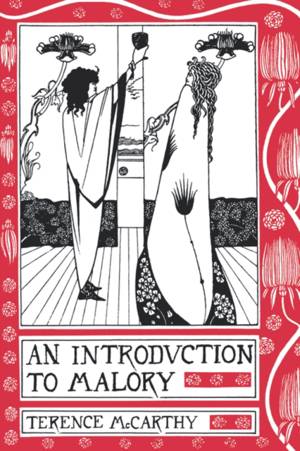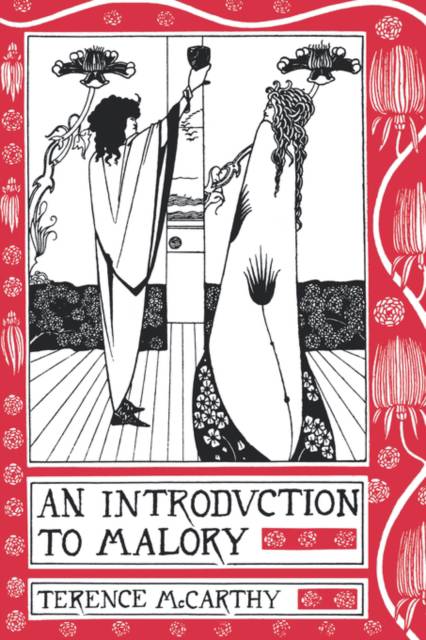
Je cadeautjes zeker op tijd in huis hebben voor de feestdagen? Kom langs in onze winkels en vind het perfecte geschenk!
- Afhalen na 1 uur in een winkel met voorraad
- Gratis thuislevering in België vanaf € 30
- Ruim aanbod met 7 miljoen producten
Je cadeautjes zeker op tijd in huis hebben voor de feestdagen? Kom langs in onze winkels en vind het perfecte geschenk!
- Afhalen na 1 uur in een winkel met voorraad
- Gratis thuislevering in België vanaf € 30
- Ruim aanbod met 7 miljoen producten
Zoeken
€ 48,45
+ 96 punten
Omschrijving
This introduction to Morte Darthuroutlines the book's basic character, followed by a study of the key concepts of love, loyalty, sin and shame. Malory's approach to his material is discussed, as are his sources, and his individual contribution; finally, Maloryand his book are placed in their historical context. Published in 1988 as Reading the Morte Darthur. `Presents in very accessible form the explanatory material which [students] will require. He is well-informed about the basic issues in Malory scholarship and criticism, and his approach is sound.' REVIEW OF ENGLISH STUDIES`This book is aimed specifically at readers approaching Malory's Morte Darthur... it will be very useful both to new readers and to their instructors.' CHOICEThe Morte Darthuris a book of action and adventure, not a book of thought. It is full of unexplained and inexplicable customs, magic and mystery, love and hate, nobility, villainy and the highest ideals. Among its characters are the heroes and heroines of the greatest love stories in the western tradition, and it appeals to our most basic and powerful sentiments. Terence McCarthy's book is an introduction to Malory, and so the first section is designed to show how to go about reading the Morte Darthur, and to outline aspects of its basic character. The remaining sections offer an interpretation of it, beginning with the key concepts of love, loyalty, sin and shame.
The reader is urged to resist the temptation to consider the Morte Darthuras an early novel, and Malory as omniscient narrator, in order to see him as he saw himself - a historian chronicling the public events of a kingdom. Even his much-praised style underlines the formal and traditional aspect of his book. The Morte Darthuris based on inherited material, and while it is not necessary to know all the intricacies of Malory's sources, Terence McCarthy shows how Malory worked and the extent and nature of his individual contribution. A brief final section puts Malory and his book in their historical context: the turmoil of late fifteenth-century England may be a striking contrast to the order and harmony Arthur achieved (and lost), but too precise an interpretation will remain fruitless until weknow more about Sir Thomas Malory -including who he actually was.
The reader is urged to resist the temptation to consider the Morte Darthuras an early novel, and Malory as omniscient narrator, in order to see him as he saw himself - a historian chronicling the public events of a kingdom. Even his much-praised style underlines the formal and traditional aspect of his book. The Morte Darthuris based on inherited material, and while it is not necessary to know all the intricacies of Malory's sources, Terence McCarthy shows how Malory worked and the extent and nature of his individual contribution. A brief final section puts Malory and his book in their historical context: the turmoil of late fifteenth-century England may be a striking contrast to the order and harmony Arthur achieved (and lost), but too precise an interpretation will remain fruitless until weknow more about Sir Thomas Malory -including who he actually was.
Specificaties
Betrokkenen
- Auteur(s):
- Uitgeverij:
Inhoud
- Aantal bladzijden:
- 192
- Taal:
- Engels
- Reeks:
- Reeksnummer:
- nr. 20
Eigenschappen
- Productcode (EAN):
- 9780859913256
- Verschijningsdatum:
- 1/12/1988
- Uitvoering:
- Paperback
- Formaat:
- Trade paperback (VS)
- Afmetingen:
- 157 mm x 235 mm
- Gewicht:
- 326 g

Alleen bij Standaard Boekhandel
+ 96 punten op je klantenkaart van Standaard Boekhandel
Beoordelingen
We publiceren alleen reviews die voldoen aan de voorwaarden voor reviews. Bekijk onze voorwaarden voor reviews.









